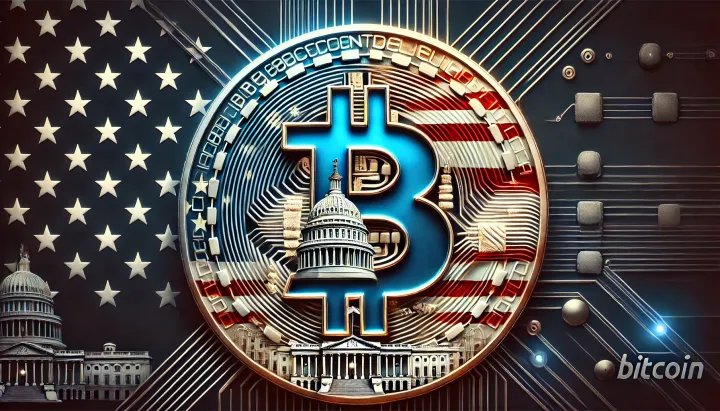Strategic Bitcoin Reserve: Bridging Fiscal Policy and Digital Innovation
The February 1, 2025 episode of Simply Bitcoin, featuring Senator Cynthia Lummis and Dennis Porter, outlines a proposal to establish a Strategic Bitcoin Reserve aimed at reducing national debt and protecting digital asset rights, emphasizing bipartisan legislative support and state-level innovation.

- My 'briefing notes' summarize the content of podcast episodes; they do not reflect my own views.
- They contain (1) a summary of podcast content, (2) potential information gaps, and (3) some speculative views on wider implications.
- Pay attention to broadcast dates (I often summarize older episodes)
- Some episodes I summarize may be sponsored: don't trust, verify, if the information you are looking for is to be used for decision-making.
Summary
The February 1, 2025 episode of Simply Bitcoin, featuring Senator Cynthia Lummis and Dennis Porter, outlines a proposal to establish a Strategic Bitcoin Reserve aimed at reducing national debt and protecting digital asset rights, emphasizing bipartisan legislative support and state-level innovation.
Take-Home Messages
- Long-term perspective: The proposed reserve leverages existing government assets to provide a long-term fiscal safeguard.
- Reduce national debt: A successful initiative could significantly reduce national debt while bolstering the US dollar’s global standing.
- Bipartisan support: Bipartisan support is crucial for overcoming political and regulatory challenges.
- State-level reserves: State-level actions serve as innovative laboratories for testing the reserve concept.
- Clear regulatory environment: Establishing clear regulatory frameworks will protect individual Bitcoin rights and ensure market stability.
Overview
Senator Cynthia Lummis and Dennis Porter discuss a comprehensive proposal to establish a Strategic Bitcoin Reserve that would acquire up to 5% of the Bitcoin supply over a five-year period, holding the asset for 20 years. They explain that the reserve would be funded by repurposing existing Federal Reserve and Treasury assets, thereby avoiding additional taxation while providing a hard, appreciating asset. The speakers underscore that this initiative could potentially reduce the national debt by half, based on growth models derived from Bitcoin’s historical performance.
The conversation highlights the pivotal role of state governments, which, facing fiscal constraints, are already initiating related legislative efforts. Porter notes that states are uniquely positioned to implement such measures quickly due to their leaner budgets and greater policy flexibility. The discussion emphasizes that state-level innovation can provide a testing ground for broader national implementation.
Senator Lummis and Porter also explore the challenges inherent in securing bipartisan support in the Senate and establishing a comprehensive regulatory framework. They stress that a clear legal structure is essential to safeguard self-custody rights and prevent past debanking practices from recurring. The exchange reflects a shared commitment to protecting both national fiscal interests and individual digital asset rights.
Stakeholder Perspectives
- Nation-states and federal policymakers are concerned with securing the nation’s fiscal future and maintaining the US dollar's global reserve status.
- State governments view the initiative as an innovative solution to protect local budgets against inflation and currency debasement.
- Industry stakeholders and digital asset advocates emphasize the importance of clear regulatory guidelines and the protection of individual self-custody rights.
- Voters and the general public are primarily interested in the economic stability and personal financial sovereignty this initiative may offer.
Implications and Future Outlook
The discussions suggest that a strategic Bitcoin reserve could play a transformative role in national fiscal policy by providing an asset that appreciates over time and potentially offsets national debt. This initiative may strengthen the US dollar’s global standing, offering policymakers and financial institutions a new tool to balance traditional debt instruments and support economic stability.
At the state level, adopting Bitcoin reserve policies could empower local governments to better manage budget shortfalls and protect against currency debasement. By serving as early testbeds for innovative fiscal strategies, state initiatives could create scalable models for nationwide implementation, encouraging further decentralization of financial decision-making.
Broad societal impacts include enhanced economic resilience and increased individual financial sovereignty. Clear regulatory frameworks and robust protection of self-custody rights may reduce risks of financial exclusion and debanking, ultimately fostering a more inclusive financial environment. These insights highlight the importance of addressing both technological opportunities and political challenges to fully leverage the potential benefits of a strategic Bitcoin reserve.
Information Gaps
- How will the funding mechanism using existing Federal Reserve and Treasury assets be structured to avoid fiscal imbalances? This question addresses the need for clear financial guidelines to prevent unintended disruptions in government operations.
- How realistic are the projections that a Strategic Bitcoin Reserve could halve the national debt in 20 years? This question probes the underlying economic models and assumptions that forecast such debt reduction.
- What are the primary obstacles that state governments face when considering the adoption of a Strategic Bitcoin Reserve? This inquiry highlights the practical challenges at the state level, including budgetary and resource constraints.
- What strategies can facilitate bipartisan cooperation in the Senate for passing the Bitcoin Act? This question seeks to understand how political divisions can be bridged to secure the necessary legislative support.
- What are the key regulatory gaps that currently hinder a clear framework for digital asset management, and how can they be addressed? This question is crucial for developing a legal structure that protects both innovation and individual self-custody rights.
Broader Implications for Bitcoin
Policy Innovation and Fiscal Strategy
The proposed reserve initiative represents a novel integration of digital assets into national fiscal policy, potentially redefining how governments manage debt. This integration could foster innovative funding strategies that leverage hard assets instead of traditional fiscal tools. It also signals a broader acceptance of digital assets as integral to long-term economic planning.
State-Level Leadership and Decentralized Experimentation
States are emerging as laboratories of innovation by pioneering Bitcoin reserve policies tailored to their unique fiscal challenges. Successful state-level implementation may create a blueprint for federal adoption, demonstrating the practical benefits of decentralized policy experimentation. This approach could empower local governments to drive significant fiscal reforms independently.
Regulatory Clarity and Protection of Individual Rights
Establishing a clear regulatory framework is essential to safeguard self-custody rights and ensure compliance across jurisdictions. A robust legal structure would provide certainty for market participants and prevent abuses such as debanking. This clarity is crucial for building trust in digital asset systems and ensuring they contribute to financial stability.



Comments ()